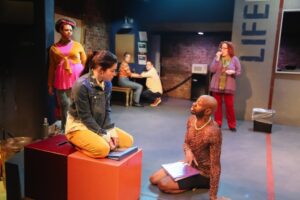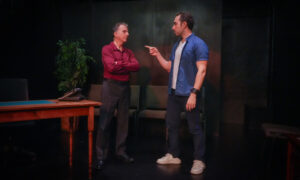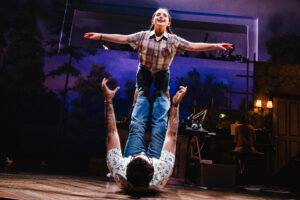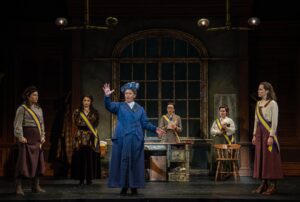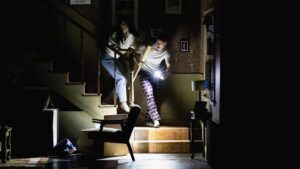Theatre 40 has been around LA’s theatre scene as long as I have. The group routinely combines adventurous offerings with copious opportunities for its members to stretch their wings. Its latest production brings together four women of the French Revolution in the anachronistic style of playwright Lauren Gunderson, who places her heroines in a living room drama as they await their (real life) beheadings.
If that sounds grizzly, it is anything but. Here, historical revolutionaries Olympe de Gouges (Kat Kemmet), Charlotte Corday (Sami Stumman) and Mariannne Angelle (played by Ashlee Olivia on the day I reviewed), along with Marie-Antoinette (Meghan Lloyd) gather in de Gouges’ home, while she struggles to find just the right tone for a revolutionary new play.
It’s important to note that the play takes place AFTER the revolution, when the First Republic had already been established, but paranoia and back-stabbing led to rampant executions. For instance, Charlotte Corday is known for having stabbed Jean-Paul Marat in his bath because he was too much of a zealot; Madame de Gouges interrupted the assembly to make her declaration of the rights of women; and Marie-Antoinette was, well, Marie-Antoinette. The only one who escapes the guillotine is Marianne Angelle created by the playwright to represent women who fought against the French to free Haiti from colonial rule.
Playwright Gunderson uses our current patois with plenty of f—bombs thrown around in each character’s dialogue, creating a disjunction in time and space. The end-result feels very much like dormmates at the end of a particularly harrowing day. Ultimately, though, the production is undone by design elements.
The first hurdle for any play at Theatre 40 is to overcome, camouflage, or alter the standing set, along with their usual furniture pieces. Director Melanie McQueen and her set designer Jeff G. Rack had to work within these parameters to the detriment of the overall production. There are several sequences that do not take place in a living room, and these are sandwiched into nooks and crannies, partially hidden by window curtains. The decision to keep the accoutrements in period, while the conversation is decidedly modern, (Costumes, by Michael Mullen and wigs, designed by Judi Lewen, are sumptuously late 18th Century) helped create a sense of disjunction.
The most interesting contribution to the examination of women at this pivotal period proves to be Marianne Angelle, a fictional rather than historical character, who serves as the author’s voice amid the women’s disparate revolutionary arguments to create the whole. Ultimately, Theatre 40’s production of The Revolutionists will send you to Wikipedia to bone up on a time when revolutionaries were eliminating one another to claim who was right. Sound familiar?



